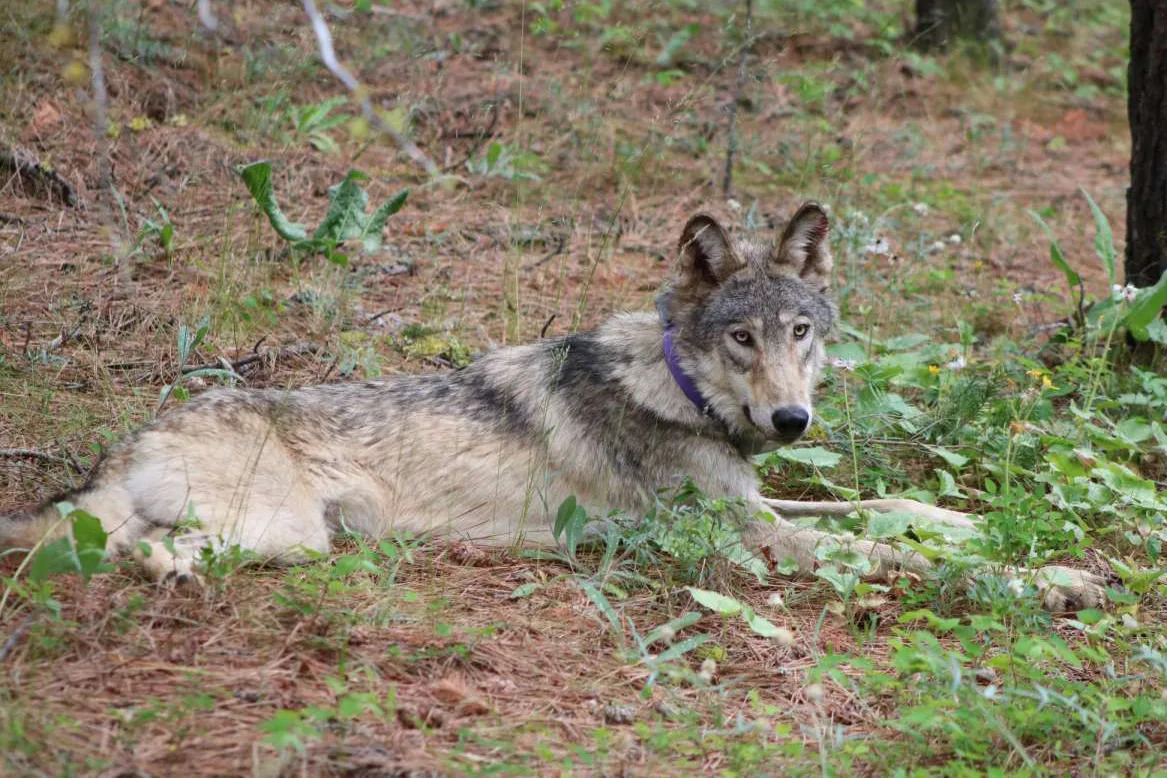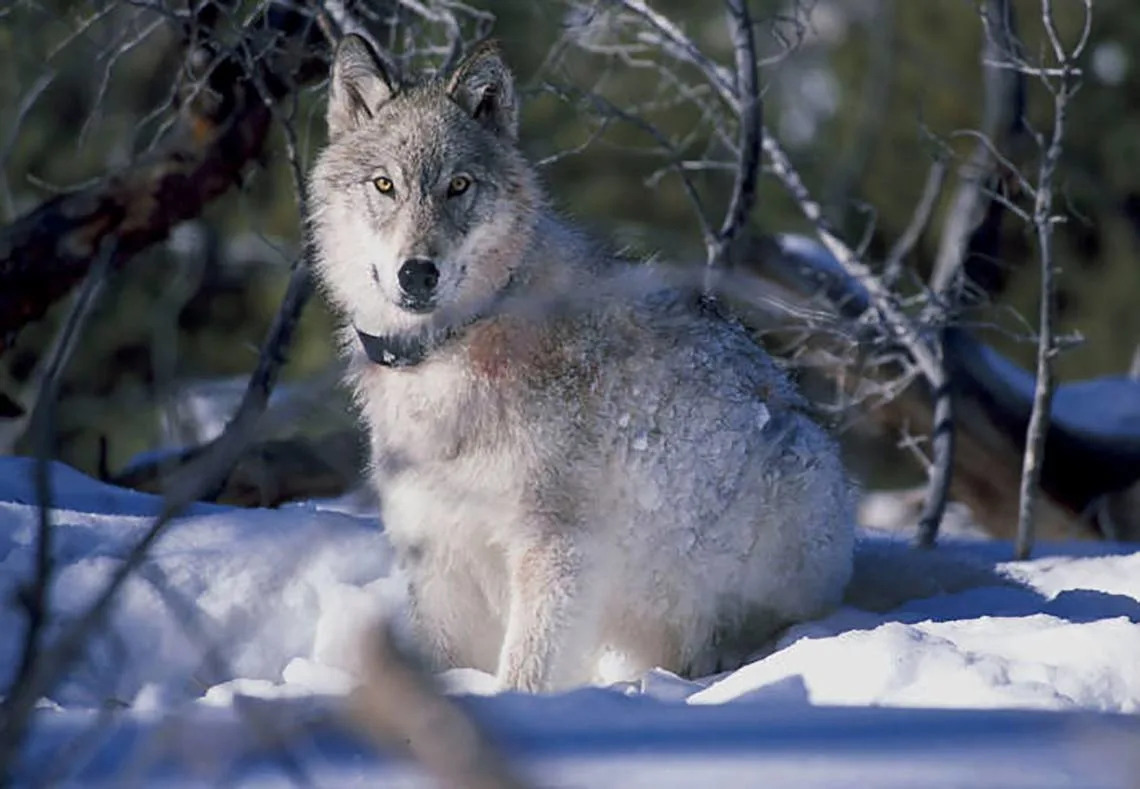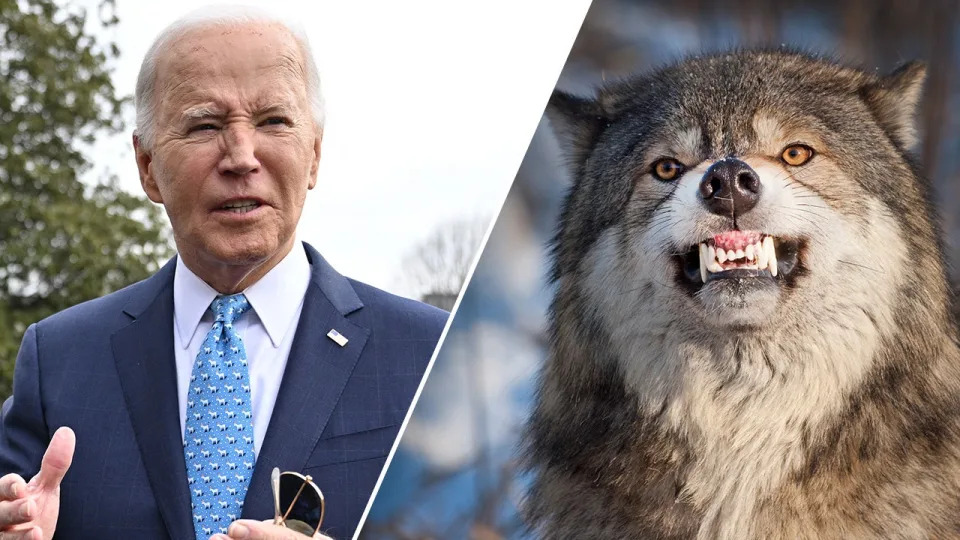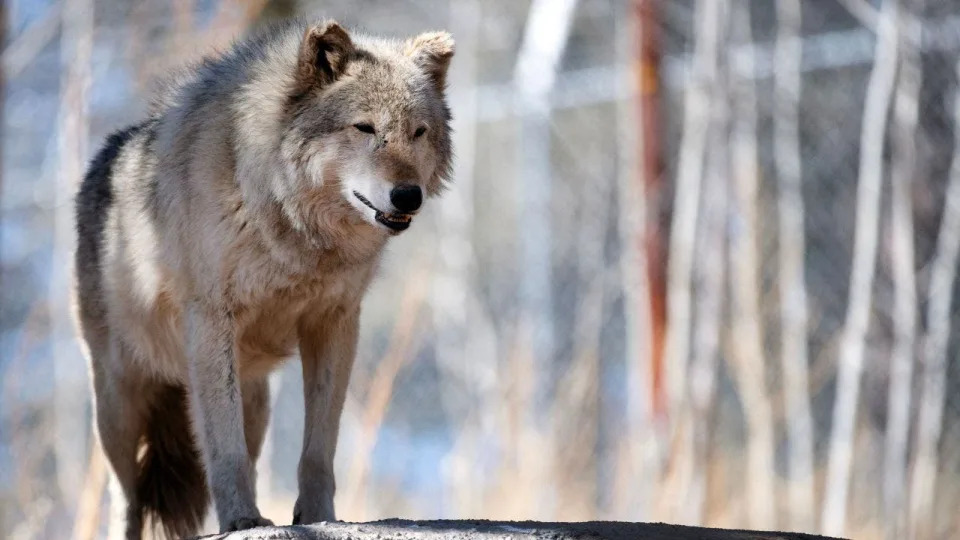Feds won't restore protections for wolves in Rockies, western states, propose national recovery plan
MATTHEW BROWN and TODD RICHMOND
Fri, February 2, 2024

In this February 2021, photo released by California Department of Fish and Wildlife, shows a gray wolf (OR-93) near Yosemite, Calif. Federal wildlife officials announced Friday, Feb. 2, 2024, that they have rejected requests from conservation groups to restore protections for gray wolves across portions of six western states, saying the population in those states is strong.
(California Department of Fish and Wildlife via AP, File)
Federal wildlife officials on Friday rejected requests from conservation groups to restore protections for gray wolves across the northern U.S Rocky Mountains, saying the predators are in no danger of extinction as some states seek to reduce their numbers through hunting.
The U.S Fish and Wildlife Service also said it would work on a first-ever national recovery plan for wolves, after previously pursuing a piecemeal recovery in different regions of the country. The agency expects to complete work on the plan by December 2025.
The rejection of the conservation groups’ petitions allows state-sanctioned wolf hunts to continue in Idaho, Montana and Wyoming. They estimated the wolf population in the region that also includes Washington, California and Oregon stood at nearly 2,800 animals at the end of 2022.
“The population maintains high genetic diversity and connectivity, further supporting their ability to adapt to future changes,” the agency said in a news release.
Conservationists who have been working to bring the wolf back from near-extinction in the U.S. blasted the decision, complaining that Idaho and Montana have approved increasingly aggressive wolf-killing measures including trapping, snaring and months-long hunting seasons.
“We are disappointed that the U.S. Fish and Wildlife Service is refusing to hold the states accountable to wolf conservation commitments they made a decade ago,” said Susan Holmes, executive director of the Endangered Species Coalition.
Antipathy toward wolves for killing livestock and big game dates to early European settlement of the American West in the 1800s, and it flared up again after wolf populations rebounded under federal protection. That recovery has brought bitter blowback from hunters and farmers angered over wolf attacks on big game herds and livestock. They contend protections are no longer warranted.
Congress stripped Endangered Species Act protections from wolves in western states in 2011. The Trump administration removed Endangered Species Act protections for wolves across the lower 48 states just before Trump left office in 2020.
A federal judge in 2022 restored those protections across 45 states, but left wolf management to state officials in Idaho, Montana, Wyoming and portions of Oregon, Washington and Utah.
Republican lawmakers in Montana and Idaho are intent on culling more wolf packs, which are blamed for periodic attacks on livestock and reducing elk and deer herds that many hunters prize.
The states’ Republican governors in recent months signed into law measures that expanded when, where and how wolves can be killed. That raised alarm among Democrats, former wildlife officials and advocacy groups that said increased hunting pressure could cut wolf numbers to unsustainable levels.
The Humane Society of the U.S., Center for Biological Diversity and other groups had filed legal petitions asking federal officials to intervene.
Despite the hunting pressure that they are under in some states, wolves from the Nothern Rockies region have continued to expand into new areas of Washington, Oregon, California and Colorado. Colorado this winter also began reintroducing wolves to more areas of the state under a plan mandated by voters under a narrowly approved 2020 ballot initiative.
There is continued political pressure to remove protections for wolves in the western Great Lakes region. When protections were briefly lifted under the Trump administration, hunters in Wisconsin using hounds and trappers blew past the state’s harvest goal and killed almost twice as many as planned.
Idaho wolves won’t return to Endangered Species list, Fish and Wildlife Service rules
Federal wildlife officials on Friday rejected requests from conservation groups to restore protections for gray wolves across the northern U.S Rocky Mountains, saying the predators are in no danger of extinction as some states seek to reduce their numbers through hunting.
The U.S Fish and Wildlife Service also said it would work on a first-ever national recovery plan for wolves, after previously pursuing a piecemeal recovery in different regions of the country. The agency expects to complete work on the plan by December 2025.
The rejection of the conservation groups’ petitions allows state-sanctioned wolf hunts to continue in Idaho, Montana and Wyoming. They estimated the wolf population in the region that also includes Washington, California and Oregon stood at nearly 2,800 animals at the end of 2022.
“The population maintains high genetic diversity and connectivity, further supporting their ability to adapt to future changes,” the agency said in a news release.
Conservationists who have been working to bring the wolf back from near-extinction in the U.S. blasted the decision, complaining that Idaho and Montana have approved increasingly aggressive wolf-killing measures including trapping, snaring and months-long hunting seasons.
“We are disappointed that the U.S. Fish and Wildlife Service is refusing to hold the states accountable to wolf conservation commitments they made a decade ago,” said Susan Holmes, executive director of the Endangered Species Coalition.
Antipathy toward wolves for killing livestock and big game dates to early European settlement of the American West in the 1800s, and it flared up again after wolf populations rebounded under federal protection. That recovery has brought bitter blowback from hunters and farmers angered over wolf attacks on big game herds and livestock. They contend protections are no longer warranted.
Congress stripped Endangered Species Act protections from wolves in western states in 2011. The Trump administration removed Endangered Species Act protections for wolves across the lower 48 states just before Trump left office in 2020.
A federal judge in 2022 restored those protections across 45 states, but left wolf management to state officials in Idaho, Montana, Wyoming and portions of Oregon, Washington and Utah.
Republican lawmakers in Montana and Idaho are intent on culling more wolf packs, which are blamed for periodic attacks on livestock and reducing elk and deer herds that many hunters prize.
The states’ Republican governors in recent months signed into law measures that expanded when, where and how wolves can be killed. That raised alarm among Democrats, former wildlife officials and advocacy groups that said increased hunting pressure could cut wolf numbers to unsustainable levels.
The Humane Society of the U.S., Center for Biological Diversity and other groups had filed legal petitions asking federal officials to intervene.
Despite the hunting pressure that they are under in some states, wolves from the Nothern Rockies region have continued to expand into new areas of Washington, Oregon, California and Colorado. Colorado this winter also began reintroducing wolves to more areas of the state under a plan mandated by voters under a narrowly approved 2020 ballot initiative.
There is continued political pressure to remove protections for wolves in the western Great Lakes region. When protections were briefly lifted under the Trump administration, hunters in Wisconsin using hounds and trappers blew past the state’s harvest goal and killed almost twice as many as planned.
Idaho wolves won’t return to Endangered Species list, Fish and Wildlife Service rules
Nicole Blanchard
Fri, February 2, 2024

Gray wolves in Idaho will not be relisted under the Endangered Species Act despite conservationist concerns, the U.S. Fish and Wildlife Service announced in a ruling Friday.
The agency’s decision concluded more than two years of analysis in response to multiple petitions regarding the animals’ status in the Western U.S. and the Northern Rocky Mountains area, which includes Idaho, Montana, Wyoming and parts of Oregon, Washington and Utah.
Fish and Wildlife Service officials said the Northern Rocky Mountains population doesn’t constitute a “valid listable entity” for Endangered Species protections. It said the Western U.S. population qualifies for protections but determined the animals don’t meet the threshold to be listed under the Endangered Species Act.
Conservation groups brought relisting petitions to the federal government in 2021 and 2022 following an expansion of wolf hunting and trapping opportunities in Idaho and Montana. Several of them expressed disappointment at the Fish and Wildlife Service decision.
Nicholas Arrivo, managing attorney for wildlife at the Humane Society of the United States, in a statement called the ruling “reprehensible” and said the agency is standing by as wolves in Idaho and neighboring states are “pushed to the brink of extinction once again.”
“The agency is essentially turning their backs on wolves,” Arrivo said.
Suzanne Asha Stone, director of the Idaho-based International Wildlife Coexistence Network, told the Idaho Statesman in a text message that the decision “clears the way for states like Idaho to brutally kill as many wolves as they want.”
“We have to ask the Biden administration: Why did the American people bring healthy wolf populations back only to see them eradicated from the landscape just a few decades later?” she said.
Friday’s ruling adds layers to an already-complex landscape of wolf protections. With the exception of wolves in the Northern Rocky Mountains area, wolves in the Lower 48 states are protected by the Endangered Species Act. The species is considered “threatened” in Minnesota and “endangered” in all other states.
Idaho has managed its wolf population since 2011, when they were removed from the Endangered Species list. The Statesman has reached out to Idaho Department of Fish and Game officials for comment on the ruling.
The Fish and Wildlife Service decision coincides with the agency’s announcement of plans to start “a national conversation” about gray wolves. The agency said it will develop a national recovery plan for the species by December 2025.
Republicans raise alarm as Biden admin prepares plan to protect wolves nationwide
Thomas Catenacci
Thu, February 1, 2024
FIRST ON FOX: House Republicans on the Natural Resources Committee are raising the alarm about a Biden administration initiative they said could lead to expanded protections for the gray wolf species, despite opposition from farmers and western states.
Committee Republicans led by Chair Bruce Westerman, R-Ark., informed Fish and Wildlife Service (FWS) Director Martha Williams that they were probing her agency's National Dialogue Around Working Landscapes and Gray Wolves and Thriving Communities and Cultures, an initiative unveiled in December. The lawmakers said oversight was necessary given the significant effect of listing the gray wolf.
"The facts are clear regarding the listing status of the Gray Wolf in the lower-48 states — the species is recovered, should be delisted, and management should be returned to the states," Westerman and eight fellow Natural Resources Republicans wrote in a letter to Williams on Thursday. "Delisting the gray wolf in the lower-48 states has traditionally garnered bipartisan support."
"Yet under the vague parameters of the Service’s proposal, the Service could begin to dictate to states what their management approaches should be," they added in the letter. "Perhaps more concerning, they could utilize this proposal as a proxy to relist wolves in the Northern Rockies without the support of the impacted States."
BIDEN ADMIN PLAN TO RELEASE PREDATOR NEAR RURAL COMMUNITIES FACES WIDESPREAD OPPOSITION: 'A HUGE THREAT'

House Natural Resources Committee Chair Bruce Westerman, R-Ark.
On Dec. 13, FWS launched its gray wolf dialogue initiative to "foster the long-term conservation of wolves and address the concerns of varied communities." The agency said the effort would include discussions involving those who live near wolf populations and those who are interested in preserving the species, and contracting a third-party conflict resolution firm to oversee the initiative.
However, while the agency said the initiative would inform its policies and future rulemaking about wolves, it did not offer any additional details about what it specifically hoped to achieve.
LOCAL RESIDENTS EXPLODE AT BIDEN OFFICIALS OVER PLAN TO RELEASE GRIZZLY BEARS NEAR THEIR COMMUNITIES
"The Committee is concerned that the 'National Dialogue Around Working Landscapes and Gray Wolves and Thriving Communities and Cultures' could potentially impact areas where wolves are delisted and currently under state management, like in the Northern Rockies Ecosystem," the Republicans wrote in their letter.

House Republicans are concerned about a Biden administration initiative they say could lead to expanded protections for the gray wolf species, despite opposition from farmers and western states.
"States in the Northern Rockies Ecosystem have a proven track record of success in managing healthy wolf populations, with current populations being stable and even slightly increasing year to year," they continued.
For years, environmental and conservation nonprofits have advocated, through both public campaigns and litigation, for FWS to maintain federal protections for the gray wolf under the Endangered Species Act (ESA). Once a species is listed under the ESA, individuals and groups are prohibited from removing, interfering with, hunting or harming it.
According to environmentalists, the gray wolf is vital to ensuring ecosystems are healthy by keeping prey populations in check.

A 14-year-old wolf stands on top of her den at the Colorado Wolf and Wildlife Center in the town of Divide.
However, western states, in addition to agriculture and livestock industry associations, have argued that gray wolves are already recovered and that any recovery plan should be overseen by state officials who are more informed about the wildlife needs within their borders. As such, in 2020, the Trump administration declared the species fully recovered in the U.S. and delisted it from the ESA.
"After more than 45 years as a listed species, the Gray Wolf has exceeded all conservation goals for recovery," former Interior Secretary David Bernhardt said in a statement at the time. "Today’s announcement simply reflects the determination that this species is neither a threatened nor endangered species based on the specific factors Congress has laid out in the law."
In early 2022, though, a federal district court reinstated the ESA protections in the lower 48 states, a decision that does not impact the Northern Rockies ecosystem. The Republicans on Thursday expressed concern that FWS would pursue further protections for the gray wolf, including in that region, as a result of its dialogue initiative.
No comments:
Post a Comment